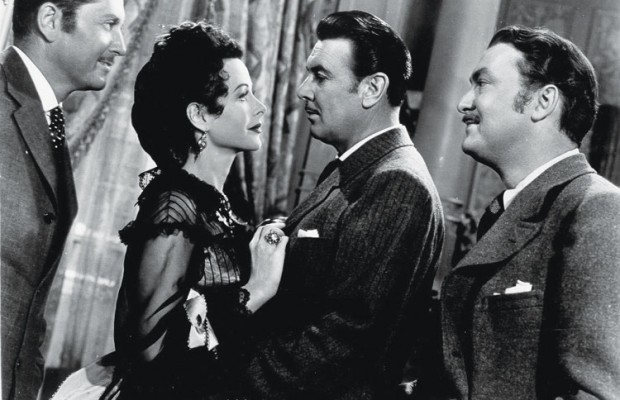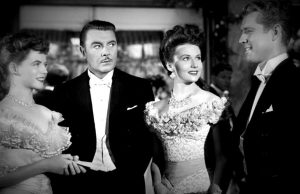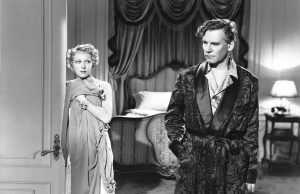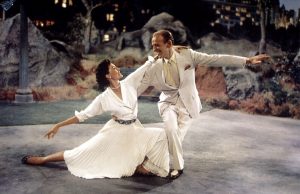Experiment Perilous (1944)

Toronto Film Society presented Experiment Perilous (1944) on Monday, February 20, 1978 in a double bill with A Woman’s Vengeance as part of the Season 30 Monday Evening Film Buff Series, Programme 7.
Production Company: RKO Radio Pictures. Executive Producer: Robert Fellows. Producer: Warren Duff. Director: Jacques Tourneur. Screenplay: Warren Duff, based on the novel by Margaret Carpenter. Photography: Tony Gaudio. Special Effects: Vernon L. Waler. Film Editor: Ralph Dawson. Art Direction: Albert S. D’Agostino and Jack Okey. Set Decoration: Darrell Silvera and Claude Carpenter. Musical Score: Roy Webb. Musical Director: C. Bakaleinikoff. Assistant Director: Dewey Starkey. Sound Recording: John E. Tribby.
Cast: Hedy Lamarr (Allida Bedereaux), George Brent (Dr. Huntington Bailey), Paul Lukas (Nick Bedereaux), Albert Dekker (Claghorne), Carl Esmond (John Maitland), Olive Blakeney (Cissie Bedereaux), George Neise (Alec Gregory), Margaret Wycherly (Maggie), Stephanie Bachelor (Elaine), Mary Servoss (Miss Wilson), Julia Dean (Deria), William Post, Jr. (D.A. MacDonald), Billy Ward (Alec at age 5), Alan Ward (Shoes), Nolan Leary (Bellhop) Larry Wheat (Caterer), Sam McDaniel (Porter), Edward Clark (Train Steward), Joel Friedkin (Brakeman), Broderick O’Farrell (Frank), Jack Deery (Doorman), Almeda Fowler (Clerk), John Elliott (Telephone Operator), Charles McMurphy (Cop), Michael Orr (Nick at age 3), Peggy Miller (Cissie at age 8), Evelyn Falke (Cissie at age 5), Janet Clark (Deria as a Girl), Georges Renavent, Adrienne D’Ambricourt (Voice Instructors), John Mylong (Nick, Sr.), Michael Visaroff (Ballet Master), Perc Launders (Ambulance Man).
In Experiment Perilous words speak louder than action. You have to listen attentively to the new film at the Palace to grasp what is going on in the mysterious household of the fabulous Nick Bederaux. But the effort is worthwhile, for Experiment Perilous is easily one of the better psychological melodramas that has come this way since Hollywood began dabbling in the macabre some months back. It is, however, unfortunate that the producers of this film elected to explore the warped mind of Nick Bederaux more in narrative than cinematic terms, for it just isn’t good movie-making when the microphone proves to be more important than the camera.
It is the skillful performance of Paul Lukas as the unfathomable Bederaux which holds Experiment Perilous together until the violent and exasperatingly routine climax. You are never quite certain whether Bederaux is the worthy philanthropist the world believes him to be or a cunningly insane monster. And the deception, which is what gives the film its suspenseful tension, lies in the excellence of Mr. Lukas’ acting rather than in the script.
When Dr. Bailey (George Brent) accidentally becomes involved in Bederaux’s family affairs, he is led to believe that something has happened to the mind of Mrs. Bederaux, who is as beautiful as only Hedy Lamarr can be in a picture book setting of 1903 luxury. Through a chance reading of a diary, Dr. Bailey acquires a deep insight into this complex man, so full of goodness and compassion on the surface, yet possessed of a basically sick mind. His means of exacting revenge upon his wife because he never could feel certain of her affections is not exactly unique, but it is interestingly and effectively presented.
Mr. Brent gives a good, solid performance and Miss Lamarr, to repeat, is every bit as fascinating as the script makes her out to be. Lesser roles are nicely played by Albert Dekker and Olive Blakeney. Experiment Perilous is well calculated to hold your attention, despite its excessive talkativeness.
The New York Times Film Reviews, Thomas M. Pryor, December 30, 1944
Notes compiled by Peter Poles
NOTE: Jacques Tourneur, the director, died in France on December 22, 1977.












Leave a Reply